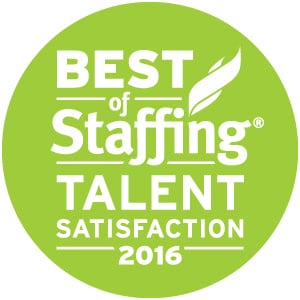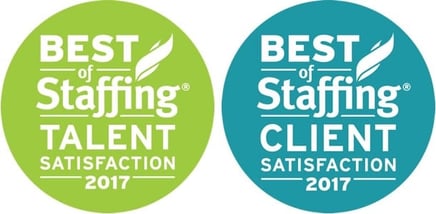Trust us. Artisan Talent has been in the business of placing job seekers in new roles for decades. We’ve been searching our noggins and discussing our experiences, and we think we have the perfect list of the top 30 job skills you’re going to need in 2018.
Following these tips will make you more attractive to employers in the New Year. They’ll brush off some dusty skills and impart new ones into your worker tool belt. This list might even reinvigorate your commitment to a career where you’ve been feeling burnt out. Or, they may lead you down a new path toward a new gig that you’ll really love.
Whether you’re a stay-at-home mom or dad looking for a little freelancing cash, a seasoned professional trying to stay relevant, or a millennial searching for your first job, this guide is for you.
Workplace Trends for 2018
Let’s start with some of the workplace trends that we’re predicting for next year. So much has changed in the last five years, and the biggest shift in the traditional 9 to 5 job is that they’re just not the norm anymore.
The Freelancers Union says that one in three Americans are either supplementing their income or making a full-time living in the gig economy. Pensions are primarily gone and while freelancing allows unprecedented freedom for the full-time entrepreneur, these jobs lack the safety net of more traditional roles.
That’s one of the more obvious changes to the world of work in this country and it’s not expected to change anytime soon.
Each year Forbes rolls out their workplace predictions for the New Year. For 2018, they’re suggesting:
- Unemployment will trend slightly downward and the demand for workers will increase, particularly in service industries.
- The corporate workspace will continue to evolve, with employers redesigning cubicle-centric vistas to allow for more open collaboration.
- New learning credentials will drop kick the traditional four-year college degree. Wary of big college debt, many workers will take advantage of the new educational disruption by sites like Coursera, edX, Udemy, Udacity, and LinkedIn Learning. Employers will increasingly accept these credentials as valid, opening the door to new, lower-cost ways of improving work and life skills for the job seeker.
- With more than six million unfilled jobs currently in the market, employers will – and should – put more effort into training their existing workforce. The onus is on employers to invest in their teams and give back in order to retain their best and brightest.
With these and other trends as the driver, what will 2018 look like for job seekers? What skills must they master in order to stay competitive in the job market?
Top 30 Need-to-Know Job Skills
- The first job skill is to improve how you present yourself. That means giving your CV a good scrubbing to eliminate typos, unnecessary words, and that multi-colored🦄 unicorn logo that seemed like a good idea in 2016.
To Do: Consider hiring a professional resume writer to help give your resume a more competitive edge. - If you haven’t mastered social media, now is the time. Literacy in social media is crucial for many of the more public-facing roles in business.
To Do: Take a critical look at social media for your own personal brand. Demonstrate your social media confidence (and competence) by creating a persona that will get your job skills noticed. - Speaking of social media, consider broadening your portfolio by learning a marketable skill related to the medium. For example, you could take an SEO workshop (yes, SEO still matters).
To Do: Here’s a $15 intro class on Facebook advertising to get you started. Sure, it’s from Cracked, but just because they’re sarcastic doesn’t mean it’s a bad class. - On the softer side of the job skill list, consider practicing your problem-solving skills. Employers are increasingly looking for employees that can creatively troubleshoot problems.
To Do: Think back on examples of how you solved issues and practice concisely sharing the story of the results you achieved. Then work these into your resume and into interviews. - Understand data analytics. From marketing to sales to supply chain, we live in an increasingly data-driven world. Understanding the basics of computational thinking will be valuable in any job.
To Do: Take an Excel online class to finally master the software. Here are free video tutorials from Microsoft. - Become an expert in Google Analytics. Google remains the master of the search engine universe. The data gleaned from website interactions with the platform remains one of the best ways to gauge the effectiveness of your brand.
To Do: Take the free Google Analytics for Beginners course and use it as the launch bad for greater understanding of the platform. - Improve your data visualization skills. Taking data and making it palatable for an audience requires one-part data analytics and one-part creativity.
To Do: Take a data visualization course at Udemy. - Improve STEM skills. STEM stands for “science, technology, engineering, and mathematics.” STEM goes beyond the curriculum to teach critical thinking skills, something every employer is going to look for in the future.
To Do: Start your research by reading this Wired article. - Read more. Use social media to follow thought leaders and companies you dream of working for. Take a part of your lunch and read more.
To Do: Add Audible to your phone and use the commute to stretch your mind in new ways. - Learn a computer language. It could be something as simple as HTML to enable Word Press sites. Or, C# or Java might make you more employable, especially in a small business or a startup.
To Do: Research local and online classes to help turn you into a mini-developer. Look for developer boot camps in your region to get you started. - Be more creative and share it. In 2018, employers will be looking for new ways to solve problems. Fresh ideas and out-of-the-box thinking won’t just be clichés next year. According to The Muse, employers will look for “novel and adaptive thinking.”
To Do: Give thought to ways that you have tried a new approach to a task and were pleasantly surprised by the result. How does your creativity make you different — and valuable? - Improve your resiliency by setting goals and achieving them, no matter how difficult they may be.
To Do: Subscribe to websites like The Daily Good that shares motivational and inspirational articles designed to keep you moving forward. - Practice the art of mindfulness as a way to calm your mind and facilitate better health and clearer thinking. Now, who couldn’t use that as a skill in the workplace?
To Do: Here’s a free class from a certified mindfulness instructor. - Expand your creative skills by learning front end web design. While there is some coding involved, this role includes understanding the psychology behind how we interact with websites online and on our phones.
To Do: Take a front end web developer class. - Go back to the basics by studying some of the most relevant principles that apply to your business field.
To Do: Read the oldie-but-goodie Good to Great by Jim Collins. - Always be learning. Your willingness to learn new things will go a long way with employers looking to stretch roles during labor shortages. Push yourself to learn a new skill outside your comfort zone and expand your horizons.
To Do: Join a MeetUp group for the New Year. - Speaking of MeetUp groups, improve your networking skills. Networking is a skill that can not only help you communicate at work – it can help you find your next job, especially if you meet creative Recruiters while you're at it.
To Do: Go to Eventbrite.com and type in your city. Pick an event and go. Take business cards and practice talking to strangers. - Improve your cross-cultural competency by brushing up on that high school Spanish or learning a new language.
To Do: Check out DuoLingo and improve your skills for free. - Project managers are the experts that push teams to perform. Learning these skills can cross over to any job you’re seeking.
To Do: Take a LinkedIn class on Project Management. - Become Six Sigma certified. Six Sigma is the gold standard for quality improvement in many business settings.
To Do: Read this article from The Balance to find out more about Six Sigma certification and what resources are available. - Follow trends in new technology. Stay on top of the latest and greatest applications in your field. Learn to spot trends, find what’s most useful, and apply it to your career.
To Do: Here’s a great article from Miradore with the best tech websites to bookmark to stay in the know. - Master the tools of the virtual trade. Whether you’re learning how to use GoToMeeting, Zoom, or Skype for the first time or trying a document collaboration tool like Basecamp, make certain you stay up-to-date on the latest tools to help run virtual meetings.
To Do: Take a peek at this list of virtual communication tools and become familiar with their platforms. - Practice and improve communication – and we’re not talking about texting faster. Improving your public, private, and presentation communication skills is a must for 2018.
To Do: Six Minutes is a good, free resource with lots of tips to practice. - Start a mentoring program at your office. Or, join an existing program. Mentoring helps employees acclimate and helps organizations share knowledge. Participating in these programs is a great job skill.
To Do: Inc. has a great article on how to start a mentoring program. - Volunteer at a community organization of your choosing. Not only will it make you feel good, it is a resume builder that we can get behind.
To Do: What do you care about? Once you’ve figured out the cause, let your fingers to the walking to a local organization that can put your skills to good use. - Pick up a side gig to improve your resume skills. For those in full-time roles, consider finding a flexible freelance gig through Artisan Talent. It will build your portfolio while also helping protect your family in the event of an unexpected job reduction.
To Do: Contact Artisan Talent to talk with a job counselor. Make that connection and reap some ROI this year. - Use your hobby to further your career or to create a new, lucrative side gig. Maybe you’ve always been a good writer but never really honed the skill. The point is to start thinking about what you know and how you can use it as a side – or a primary – job hustle.
To Do: Contact the talent team at Artisan Talent for your next side gig. -
Go back and get that degree. Just. Do. It.
To Do: Did you know Courseara now offers an online master’s degree program?
-
Get more organized. If this has been your New Year’s resolution for the last five years...Houston, we may have a problem. Staying organized takes time and energy. If you’re struggling to maintain and follow through, there may even be resources around you that can help.
To Do: Find a methodology that works to help you stay on top of deadlines and tasks. There are dozens of phone apps out there, but perhaps just a simple desk planner is more your style. Either way, find what works – and work it! -
Find your work/life balance. If you don’t think this is a job skill, you probably haven’t found the balance yet. In our increasingly hectic world, taking the time to figure out how to pace yourself in your job(s) and in your life will help you improve in both areas. We promise.
To Do: There’s an app for that; The Muse lists six to choose from.
The Ultimate 2018: Have Job Skills, Will Travel
Technology has forced us to evolve in new and unexpected ways. By 2020 we suspect many of the jobs we see today will radically change. This is forcing unprecedented shifts in the skill sets we need to stay on top of a changing job market.
Yet the most important skill we can learn and practice is simply our ability to continue to grow as people — and as employees. Becoming a student in a lifelong learning process will not only improve your job skills, it will open unexpected doors as you continue to challenge yourself.
Need Help?
The Artisan team believes in the power of our individual skills tied together in a powerful collaboration to create something better for all of us. Get in touch today if you need help in your career this year.




